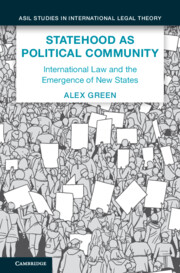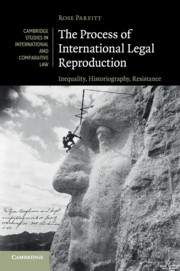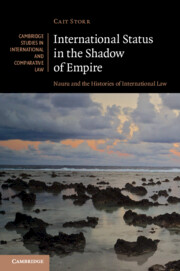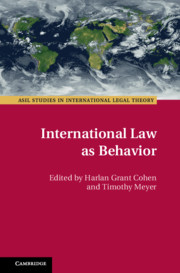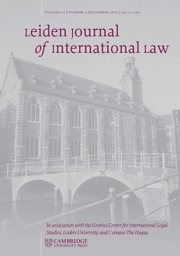Statehood as Political Community
Alex Green argues that states arise under contemporary international law only when two abstract conditions are fulfilled. First, emerging states must constitute 'genuine political communities': collectives within which particular kinds of ethically valuable behaviour are possible. Second, such communities must emerge in a manner consistent with the ethical importance of individual political action. This uniquely 'Grotian' theory of state creation provides a clear legal framework comprising four factual 'antecedents' and five procedural principles, rendering the law of statehood both coherent and normatively attractive.
- Provides the first contemporary 'Grotian' account of state creation within the anglophone literature
- Advances a distinctive account of political ethics, drawn from a broad, multidisciplinary literature
- Breaks through deadlocked doctrinal debates on the law of state creation with an innovative mode of legal reasoning, informed by analytical philosophy and normative political theory
Reviews & endorsements
‘In a time when the authority of international law is either idealized or scorned, there has never been more need for ethically informed and methodologically unorthodox reexplorations of its foundations. Alex Green’s book fills a remarkably missing piece of the international law puzzle: a normative theory of why we should recognize state creation aside from its factuality. Beyond ‘territory,’ ‘population’ or ‘government,’ what primarily inclines international law to recognize states is the deference to the value of ‘political community,’ independent of actual political regimes. A brilliant rethinking of an area that deserves better than doctrinal repetition.’ Frédéric Mégret, Professor of Law, McGill University
‘In this fascinating and timely book, Alex Green breathes fresh life into what many international lawyers would have considered a blind alley, the creation of new states in international law. Statehood as Political Community: International Law and the Emergence of New States is an outstanding piece of scholarship. It is a must-read for positivist and non-positivist international lawyers, alike.’ Başak Çalı, Professor of International Law, The Hertie School, Berlin
‘An original and compelling philosophical account of the international law of state creation. Modern states are never fully just and are often illegitimate. Yet most states play an important role in the political lives of their people, serving as fora and foci of political action. Green shows how the law of state creation can be rationally reconstructed as reflecting and protecting the value of political community, offering a powerful new perspective on longstanding debates. The declaratory and constitutive theories of recognition, the vague but central criterion of effective government, and the invalidity of state creation through aggression are cast in a powerful new light. Green cuts no corners, and skips no steps, building his argument from the foundations of personal ethics and political morality to the heights of international legal theory. An outstanding new book that will draw and inspire readers across disciplines, and make an immediate contribution to the blossoming field of international legal philosophy.’ Adil Haque, Professor of Law, Rutgers Law School
Product details
February 2024Adobe eBook Reader
9781009187633
0 pages
This ISBN is for an eBook version which is distributed on our behalf by a third party.
Table of Contents
- Introduction: reconstructing the law of state creation
- Part I. Political Community:
- 1. Political ethics and community membership
- 2. Political action and valuable institutions
- 3. The antecedents of statehood
- 4. Five procedural principles
- Part II. Stability, Legitimacy, and Democracy:
- 5. The stability thesis
- 6. The legitimacy thesis
- 7. Democratic legitimacy
- Conclusion: The nature and resilience of statehood.

